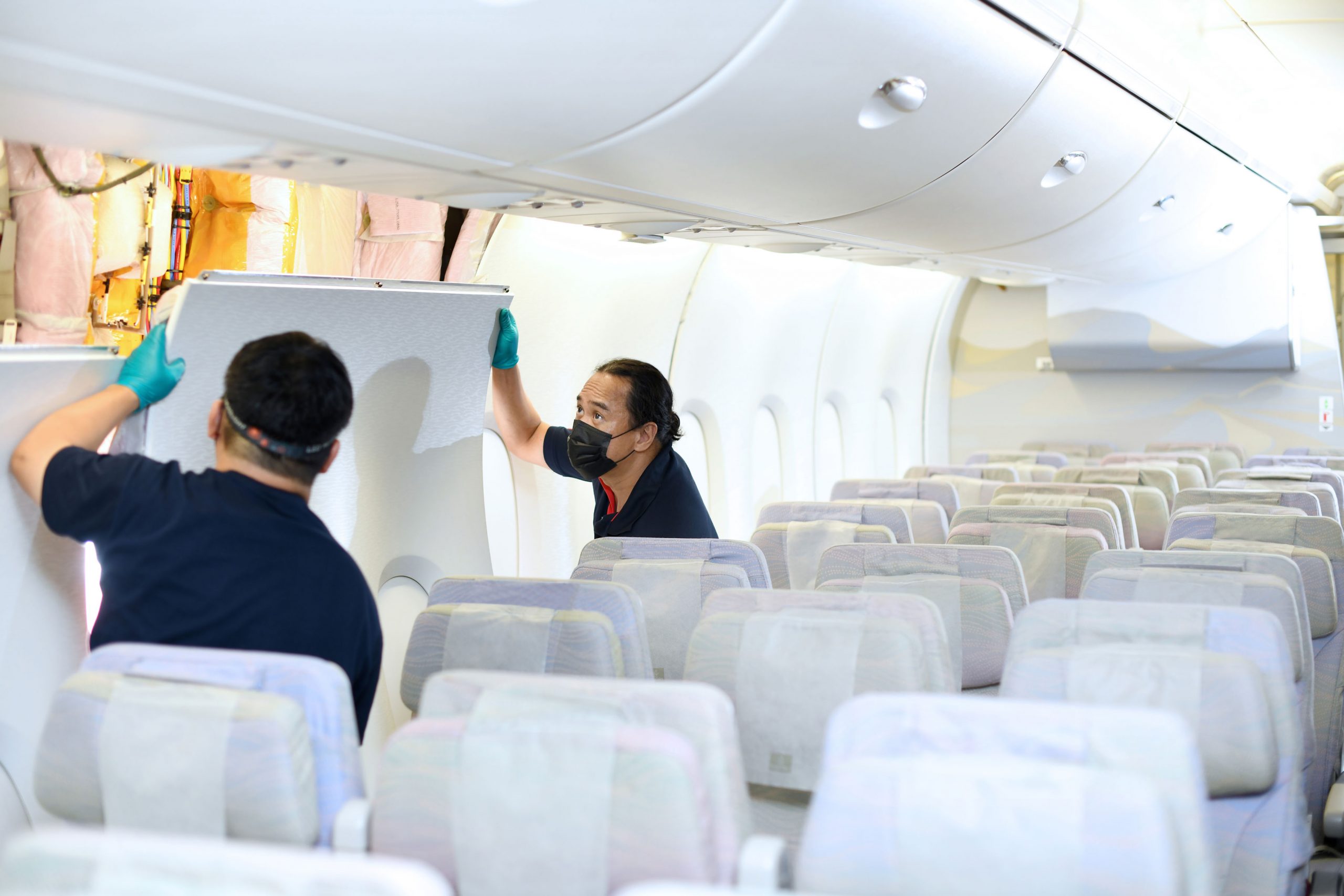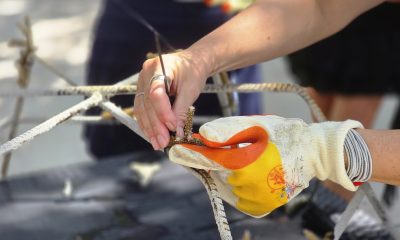International
Coronavirus hopes and fears centre on ‘immunity’

Could exposure to the coronaviruses that cause the common cold help protect against COVID-19? Is herd immunity closer than previously thought?
As nations lift lockdowns and experts worry about a potential second peak in cases, our ability to ward off infection is one of the hottest topics of scientific debate.
Ever since it became apparent that children were less vulnerable to COVID-19 early in the pandemic, scientists have speculated that the regular spread of benign viruses in places like schools could have bolstered their immune response to the latest coronavirus.
Now the idea of “cross immunity” among the broader population is gaining some ground.
In a recent post on Twitter, Francois Balloux of University College London noted an “intriguing” lack of an immediate resurgence in COVID-19 cases following the easing of lockdowns in several countries.
Among the possible explanations, he noted, were seasonality and enduring social distancing practices.
But he posited a “wilder” hypothesis as well — that a “proportion of the population might have pre-existing immunity to #SARSCoV2, potentially due to prior exposure to ‘common cold’ coronaviruses”.
Balloux said that might explain issues like cases where there is no transmission between spouses.
Earlier this month, an American study in the journal Cell suggested between 40 and 60 percent of the population could be immunized against COVID-19 without ever being exposed to it.
Researchers put this down to the action of protective cells, known as T lymphocytes, that had been activated by other coronaviruses responsible for colds.
But authors Alessandro Sette and Shane Crotty, of La Jolla Institute for Immunology, cautioned that the research did not suggest the epidemic was running out of steam.
“Clearly some individuals are more susceptible to the disease than others; after being infected some individuals have severe clinical symptoms and might even die, while others might show very little in terms of clinical symptoms,” they told AFP by email.
“Our study suggests that preexisting immunity might be one of the factors to be considered; but at this point is simply an hypothesis that needs to be addressed with further experiments.”
‘Jury out’
The World Health Organization has also expressed caution over the issue.
“There is certainly some evidence with regard to T cells, that if you have a previous coronavirus infection you may be able to mount a more rapid response to COVID-19,” said the WHO’s Michael Ryan at a press conference this week.
“But there’s no empirical evidence that previous coronavirus infections protect you from infection with COVID-19. The jury is still very much out on that,” he added.
However, Ryan said it was an encouraging sign for the development of vaccines.
“It gives us hope that we are getting the kinds of immune responses that may be helpful to long-term protection,” he said.
New waves?
Another uncertainty is whether everyone is equally vulnerable to catching COVID-19.
A growing number of scientists think maybe not, raising questions over assumptions for what is known as herd immunity.
Gabriela Gomes, a researcher at the Liverpool School of Tropical Medicine, told AFP that it was wrong to assume that one person is as susceptible to the virus as another, or as exposed.
“We know little about the factors which underlie this individual variation. It could be cross-immunity with other coronaviruses, but it could also be other microbes, genetics, age, behaviour, and most likely a combination of many factors,” she said.
In theory this could explain why early estimates of the proportion of individuals who have been infected by the new coronavirus have been lower than expected — at around 5 to 10 percent of the total population in several countries.
It could also mean a lower threshold for herd immunity — when a sufficient part of the population has caught the virus, starving it of new hosts to spread to and thereby stopping the epidemic.
This threshold, commonly accepted as around 60 to 70 percent of the population infected, is what Sweden hoped to achieve by deciding against a strict lockdown.
But Gomes said that mathematical models on herd immunity often “ignore individual variation”.
According to a study she co-authored, which has not yet been peer reviewed, the threshold might be reached when just 10 to 20 percent of the population has been infected.
Gomes said her research, which simulated the lifting of social distancing measures over the next six to 12 months, suggested that even if countries that had been severely affected are “closer to herd immunity”, they would still see more localised outbreaks.
There could also be “what may seem like a second wave in those countries that have been less affected so far”.
At the Pitie-Salpetriere hospital in Paris, professor of emergency medicine Yonathan Freund has noticed a sharp drop in the number of infections among doctors compared with the start of the epidemic.
“This is pure speculation but it could mean that people have natural or acquired immunity,” he told AFP.
It is giving him confidence.
With infections staying low three weeks after France lifted its strict lockdown measures, he thinks that could mean “the second wave is not coming and probably will not happen” in the country.
Reporting and photos: AFP
International
Nika Zorjan’s ‘V Postelji’ music video showcases timeless beauty of Maldives

Released just three weeks ago, Nika Zorjan’s latest music video, ‘V Postelji’ (meaning “In Bed”), has captivated audiences with its stunning cinematography set against the breathtaking backdrop of the Maldives. Directed by videographer Niko Karo, who accompanied Nika to film the video, the project was organised by Moji Maldivi, an agency based in Slovenia dedicated to promoting the Maldives as a premier holiday destination in Balkan region.
The video beautifully captures Nika strolling through serene pathways shaded by iconic coconut palm trees at Villa Park, later walking along the sun-kissed beaches of Villa Nautica, and finally enjoying the golden sunset on a bed at the beach of Furaveri Maldives. Each scene showcases the natural beauty and tranquil ambiance of the Maldives, enhancing the emotional depth and visual splendour of the music video.
Nika Zorjan, renowned as a Slovenian pop star and Eurovision contestant, has also gained fame for her cover songs, including her most popular rendition of Sia’s Cheap Thrills, which has amassed nearly 50 million views on YouTube, with over 60 million total views on the platform. “Shooting a video in the Maldives is heavenly,” she added. Filmed in one of the world’s most captivating tourist destinations, the Maldives serves as more than just a scenic backdrop; it becomes an integral part of the video’s narrative.
V Postelji not only showcases Nika Zorjan’s musical prowess but also pays homage to the Maldives’ timeless allure and cultural richness. The video has resonated deeply with audiences, garnering praise for its artistic vision and the mesmerising beauty of the Maldivian landscape. The lush greenery, crystal-clear waters, and pristine beaches depicted in the video create a sense of paradise that complements the song’s evocative lyrics.
As viewers continue to immerse themselves in the captivating visuals and emotive melodies of V Postelji, it reinforces the Maldives’ reputation as a destination where natural beauty and tranquility converge effortlessly. Nika Zorjan’s collaboration with Niko Karo underscores their shared appreciation for the Maldives’ serene ambiance and its ability to inspire creativity and emotional expression. This partnership, facilitated by Moji Maldivi, highlights the agency’s dedication to showcasing the Maldives as an unparalleled holiday destination to the Balkan market.
Featured
Emirates undertakes largest known fleet retrofit project

Emirates has kick-started its plans to upgrade the entire interior cabins of 120 Airbus A380 and Boeing 777 aircraft – two of the largest commercial aircraft types in service today.
This ambitious project, representing a multi-billion dollar investment to ensure Emirates’ customers “fly better” for the coming years, officially commences in November and is managed entirely by Emirates’ Engineering team.
The target is to completely retrofit four Emirates aircraft from start to finish every month, continuously for over 2 years. Once the 67 earmarked A380s are refreshed and back in service, 53 777s will undergo their facelift. This will see nearly 4,000 brand new Premium Economy seats installed, 728 First Class suites refurbished and over 5,000 Business Class seats upgraded to a new style and design when the project is complete in April 2025.
In addition, carpets and stairs will be upgraded, and cabin interior panels refreshed with new tones and design motifs including the iconic ghaf trees which are native to the UAE.

No other airline has handled a retrofit of this magnitude in-house, and there’s no blueprint for such an undertaking. Therefore Emirates Engineering teams have been planning and testing extensively, to establish and streamline processes, and identify and address any possible snags.
Trials began on an A380 in July, where experienced engineers literally took each cabin apart piece-by-piece and logged every step. From removing seats and panelling to bolts and screws, every action was tested, timed and mapped out. Potential impediments to completing the installation of Emirates’ new Premium Economy Class or the retrofit of the remaining three cabins in just 16 days were flagged and documented for expert teams to review and address.
As part of the programme, new purpose-built workshops will be set up at Emirates Engineering to repaint, re-trim and re-upholster Business and Economy Class seats with new covers and cushioning. First Class suites will be carefully disassembled and sent to a specialised company to replace the leather, arm rests and other materials.
From the trials, Engineers discovered several unexpected solutions for instance: that existing food catering trucks could be easily repurposed to move parts destined for refurbishment from the aircraft to the workshop for their refresh, as these vehicles had doors of the right width and offer sufficient space.
Until the retrofit programme starts in earnest in November, a cross-disciplinary team has been assembled to regularly review the planning process, address any issues, and track updates on various aspects of the project such as procurement, staffing, and training.
Emirates’ new Premium Economy cabin class, which offers luxurious seats, more legroom, and a service to rival many airlines’ business offering, is currently available to Emirates customers travelling on popular A380 routes to London, Paris, Sydney. More customers will be able to experience the airline’s new Premium Economy cabins starting from year end, as the retrofit programme picks up momentum.
Featured
Eleanor helps over 30 Maldives hotels elevate guest services

Eleanor has been named as one of the top 10 concierge software providers globally.
Based on accurate, timely reviews from real users, the HotelTechAwards rank the world’s best hotel software firms and products and it also provides hoteliers direct access to a growing network of hotel technology professionals and decision-makers.
“The guest experience is the cornerstone of our platform. Our unified resort wide solution, Eleanor, has been built for resorts off the back of many years working in the industry and addresses the needs of both Sales and Marketing departments and perhaps just as importantly, the operational requirements of the team on the ground at the property. The days of resorts working with disjointed systems are now behind us,” says Darren Caple, co-founder and CEO.
“We are on a mission to make the guest’s resort experience as easy and as frictionless as possible. Whereas traditional providers in the market have come at this purely from a guest communication perspective, our background in resorts has allowed us to combine this basic requirement with the streamlining of operational processes. The result is truly a resort wide solution that removes the need for countless different systems to be deployed.
Eleanor allows resorts to deliver consistent, superior service levels to guests across all stages of their journey with contactless features helping to alleviate sensitive touch-points in the post pandemic period. More than 30 properties in the Maldives use our Eleanor platform to help butlers and guest services elevate the guest experience. These properties are seeing an increase in incremental revenue by over 30% and operational efficiencies of 600+ man hours per month. We are also beginning to roll out the platform in some Caribbean properties!”
Eleanor is making waves in the hospitality industry by pushing the conventional limits of what a resort guest app can achieve through its unique ability to facilitate direct bookings for services and activities. The traditional ‘request to book’ feature that is common amongst almost all other hotel apps is removed by a power booking and operational platform sitting at the heart of the solution that covers all the resorts’ departments. It’s this module which realises enormous operational benefits and insights for the resort.
“We, at Eleanor, are humbled and honoured that our clients have provided such positive reviews. Feedback from our clients, partners and hoteliers are incredibly valuable for us and we will continue to improve our offering and services”, said Caple.
To celebrate this success, Eleanor is currently offering resorts a free one month trial, together with free setup and training and discounted monthly fees.
Eleanor, founded in 2018 and has its headquarters in the United Kingdom. Created from over 15 years of hands-on expertise, Eleanor allows resorts to deliver consistent, superior service levels to its guests across all stages of their journey with contactless features helping to alleviate sensitive touch-points in the post pandemic period. Eleanor also helps to unlock operational efficiencies and boost incremental revenue and guest loyalty.
Hotel Tech Report’s Best Concierge Software 2022 Runner Up, reviewed as a preferred and reliable hotel software product by the global hotelier community.
For more information, visit www.eleanorapp.com.
-

 Cooking1 week ago
Cooking1 week agoPatina Maldives, Khyber unite for Holi festival dining experience
-

 Featured1 week ago
Featured1 week agoCinnamon Hotels & Resorts Maldives launches March flash offer with savings of up to 80%
-

 Action1 week ago
Action1 week agoNoku Maldives strengthens reef protection through coral propagation
-

 News1 week ago
News1 week ago‘Endless Summer’ brings wellness and family escapes to Westin Maldives Miriandhoo Resort
-

 News1 week ago
News1 week agoKandooma champions collaboration as cornerstone of sustainability progress
-

 Featured1 week ago
Featured1 week agoSt. Regis Maldives Vommuli Resort curates timeless Valentine’s experiences with IVAR Jewellery
-

 Food3 days ago
Food3 days agoMichelin-starred Italian chef Maurizio Bufi brings Lake Garda flavours to The Ritz-Carlton Maldives, Fari Islands
-

 Drink7 days ago
Drink7 days agoThe Nautilus Maldives hosts Gregor Zimmermann for three-day Easter gastronomic programme









